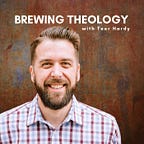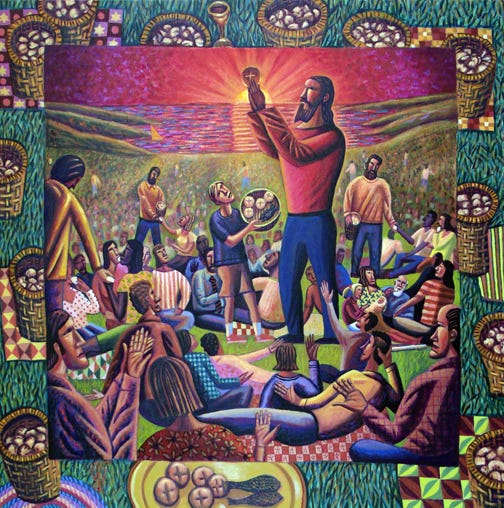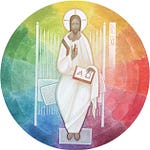Today, we are making a leap a canonical-leap of biblical proportion, from The Gospel of Mark to The Gospel of John, specifically, the sixth chapter of John. We will be in John 6 through the end of August. John Six is famously known as the Bread of Life passages. As you hear the scriptures read over the coming weeks, you will recall the liturgy and symbols of the Great Thanksgiving: The Lord’s Supper, the sacrament that sustains and equips the Church (Christ’s body) in a world that is in desperate need of God’s grace.
The crowds grew larger by the day as Jesus performed signs of His authority, healed those thought to be beyond help, and taught about his authority. Jesus calmed the seas, controlling the wind and waves when the disciples thought they were doomed to sink. Jesus raised Jairus’ daughter from the dead and healed a woman who had been bleeding for 12 years. Jesus got into hot water with the religious authorities because he healed a man who had been ill for 38 years. The problem was that Jesus healed this man on the Sabbath, and when confronted by the religious authorities, not only had Jesus broken number four on God’s top ten, but Jesus also claimed that God was his father, thus making himself equal to God.[i]
The crowds following Jesus continued to grow. The crowds followed Jesus because they thought he was entertaining. Seeing everything they saw and hearing everything they heard kept the crowds coming back for more. There was always something happening—a sign, a healing, or a confrontation—and in following Jesus, the temporal needs of the crowd were met. The crowds were satisfied seeing and hearing what Jesus was doing and saying.
The late Episcopal Priest, Robert Capon wrote, “Jesus' miracles are not meant to be magic tricks to dazzle the crowd; they are profound signs that point to the mystery of God’s grace breaking into our world.”[ii]
This brings us to Jesus crossing the Sea of Galilee, and when Jesus realized the crowd was growing even larger than before asked Phillip, “Where are we to buy bread for these people to eat?”[iii] Feeding five thousand people in one sitting is no small feat. The procurement and distribution logistics alone are enough to cause even the best caterer to panic. Philip acknowledged that the financial burden would be at least six month’s wages, and even that would not satisfy the needs of the people in the crowd.
To be satisfied is the goal of pretty much everything we do. In your professional life, if you are not satisfied with your work, you might make a move to a new employer or even a new line of work. If a vendor you are working with is not providing a service that satisfies your organization's needs, you will find a new vendor that can. We all want relationships that satisfy our needs and goals. Parents want schools that will satisfy their children's educational and developmental needs. Even in church, if a church, if a pastor does not satisfy your needs and the needs of your family, it is easy to find a church that will.
Theologian Robert Jenson wrote, “Our culture's relentless pursuit of satisfaction through material means obscures the true satisfaction that comes from being known and loved by God.”[iv]
“Satisfaction Guaranteed” is a phrase baked into our daily routines, so much so that we rarely think about it until that guarantee is unmet.
Andrew told Jesus, “There is a boy here with five barley loaves and two fish. But what are they among so many people?”[v] It was the kid’s lunch. The boy’s parent packed the lunch and then sent the kid out of the house for the day. After all, how much trouble could the boy cause following Jesus? After hearing Andrew’s observation, the disciples might have thought, “Oh great, Andrew. Sure, we’ll divide the boy’s lunch among the five thousand.”
Jesus took the boy’s lunch, five loaves, and two fish, and, after giving thanks to God, distributed the food to the people. There was enough food, so much so that everyone was “satisfied,”[vi] and there were 12 baskets of leftovers. When the people in the crowd realized what had occurred – John calls this a sign – they declared Jesus a prophet and wanted to make him their king (by force).
The crowd may have thought, “If he can satisfy the needs of five thousand people, surely he can satisfy the needs of a nation longing for a king who would overthrow an occupying force.”
In all that Jesus did and said – in his signs, healings, and teachings – Jesus never made the overthrow of an oppressor or government the focus of his ministry. Jesus' mission was centered on the Kingdom of God, the imminent realization of the fullness of God's grace.
Professor of New Testament and Jewish Studies, Dr. Amy-Jill Levine, emphasizes the connection between God providing for Israel in the wilderness and Jesus satisfying the needs of the five thousand on a hillside near the Sea of Galilee. God satisfied the hunger of the formerly enslaved Israelites with bread as Moses led Israel out of Egypt and through the wilderness. God told Moses, “I am going to rain bread from heaven for you, and each day, the people shall go out and gather enough for that day.”[vii] You see, the extravagant grace of God satisfies our needs in ways others offering a satisfaction guarantee can only dream of.
Jesus retreated from the crowd as they began to express a desire to “force him to be a king.” Imagine forcing God to do something.
The disciples boarded a boat and set sail to Capernaum. John tells us, “The sea became rough because a strong wind was blowing along the way.[viii] The storm was beating against the boat. After three or four miles, the disciples see, off in the distance, Jesus walking to them. Unlike Jesus calming the sea in The Gospel of Mark, here Jesus does not calm the storm but instead tells the disciples, "It is I am; do not be afraid,”[ix] again echoing the voice of God in Exodus, and then the disciples reach the shore. Their need to reach the shore amid rough seas was met.
Next Sunday, Jesus will call himself the bread of life. The One who sustains and gives new life to all of creation, not because of what we have earned or the guarantees we have fulfilled but rather because of the grace of God. As the bread of life, Jesus is what sustains and satisfies our souls.
Rev. Fleming Rutledge wrote, “Jesus is not the king we expect, but he is the king we need – a king whose power is made perfect in weakness, whose glory is revealed in the cross, and whose reign brings true and lasting peace.”[x] The king we think Jesus to be is not how he appears to us in Word, Sacrament, and through the incarnational ministry of his body, the Church. To declare Jesus to be king, to place our whole trust in his grace, is to realize that Jesus satisfies and sustains us in the ways we least expect but desperately need.
Christianity often frames salvation in Jesus as something we attain in the afterlife, but Jesus is deeply concerned with our well-being here and now. He's about feeding, healing, and tending to us in the present. He doesn’t say, "Feel that hunger? Don't worry, someday in heaven, you won’t hunger." No, Jesus says, "Sit down. Take a seat. Eat. Taste and see. Be full and hold on to hope."
[i] John 5:18
[ii] Robert Farrar Capon, Kingdom, Grace, Judgment: Paradox, Outrage, and Vindication in the Parables of Jesus (Grand Rapids: Eerdmans, 2002), p. 304.
[iii] John 6:5
[iv] Robert W. Jenson, Systematic Theology: Volume 2: The Works of God (New York: Oxford University Press, 1999), p. 243.
[v] John 6:9
[vi] John 6:12
[vii] Exodus 16:4a
[viii] John 6:18
[ix] John 6:18
[x] Fleming Rutledge, The Crucifixion: Understanding the Death of Jesus Christ (Grand Rapids: Eerdmans, 2015), p. 347.















